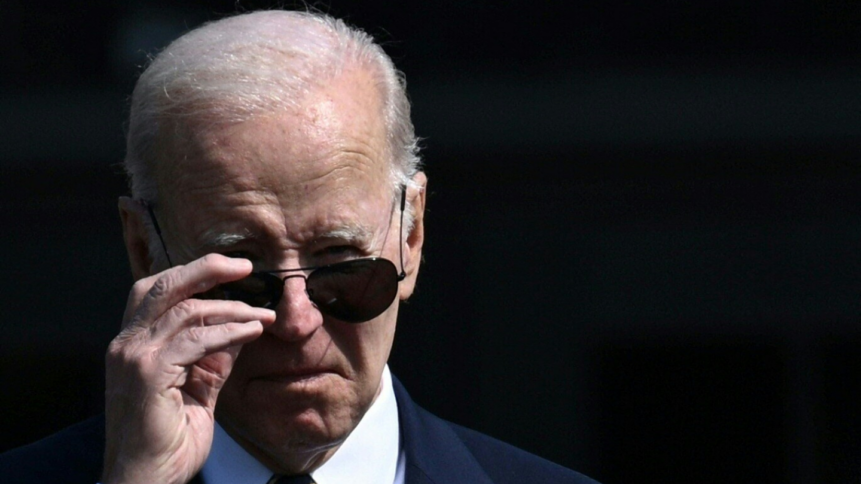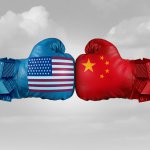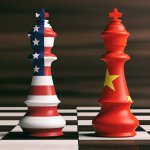Decoded: President Biden’s “no cold war” rhetoric with China

In geopolitics, the truth is rarely spoken aloud in front of the world’s media. It’s frequently felt that letting “we, the people” know what’s really going on would only cause panic, crash markets, and give political enemies a stick to hit you with. But just occasionally, you can get a sense of what’s behind the words from the delicate phrasing of sentences. That’s very much the case when it comes to the latest statement from the Biden-Harris administration in the US about a potential cold war with China.
President Biden, meeting China’s leader Xi Jinping, confidently announced that there need be no cold war with China – despite having radically escalated a protectionist and practically Trumpian trade war with China across the course of 2022, with semiconductors and chipmaking equipment as the tanks and battalions in the respective armies.
Need not
The President was technically talking about Taiwan, the island nation claimed by China as Chinese territory, despite at least officially governing itself, and counting on the US as a staunch ally, both in terms of its philosophical existence and in terms of its economic, chipmaking power.
Before you dismiss Taiwan’s power in the chipmaking world, it’s worth knowing that it accounts for a full 20% of all the chips made. In the world.
It feels callous to think about it in these terms, but it’s just possible that Taiwan is more valuable to the US in any openly-denied cold war with China than Ukraine is in terms of standing as a bulwark between Putin’s expansionist Russia and the rest of Eastern Europe.
But to leave the position as stated would be to indulge in too much false or foolish optimism.
“I absolutely believe there need not be a new cold war,” said President Biden.
Need not. Not in any sense “will not.” The meaning of “need not” is clear beneath the words. It translates directly as “will not, so long as you don’t do anything out of line.” Like invade Taiwan.
The cost of “unification”
In cooler-headed times, that wouldn’t need to be spelled out. But with China’s implacable assertion that Taiwan belongs to it, and the recent illegal expansionist moves by Putin’s Russia, it’s probably not surprising that heads are hotter than normal. In fact, just a month ago in mid-October, President Xi specifically omitted any statement that he would not invade Taiwan in a speech to the Communist Party Congress.
US Secretary of State Antony Blinken then warned that China was actively pursuing “unification” with Taiwan (a phrase about as mealy-mouthed as “non-consensual sex”), on what he called “a much faster timeline” than had previously been expected.
In response to that, President Biden, not usually a hothead but with occasional flashes of gunfighter sass peppered throughout his political career, went as far as to promise that US military forces would protect Taiwan in the event it came under Chinese attack with the intent to “unify” it.
Again, it’s worth noting that this is significantly hotter language than was used against Russia when it actively invaded Ukraine. Political ambiguity over the exact state of Taiwan’s sovereignty has been a tightrope successive US administrations have walked for decades.
President Biden, in a single statement and without metaphorically blinking once, stepped off that tightrope in October.
Honesty is not the same as calm
So that “need not” is very much a message to President Xi that essentially, the ball is in his court.
President Biden went on when the pair met before the G20 summit in Bali. “I have met many times with Xi Jinping and we were candid and clear with one another across the board,” he said.
In politicalspeak, phrases like “a full and frank exchange of views” equate to “a blazing row.” On which principle, it’s worth remembering that a conversation that ran:
“I am going to do this thing, and you had better not try to stop me.”
and “If you do this thing, I am going to punch you very hard in the face” would be perfectly within the description of being “candid and clear with one another across the board.”
Make my day…
“I do not think there is any imminent attempt on the part of China to invade Taiwan,” said President Biden. Which on the face of it, given that a readout to Chinese state media this week said that President Xi had stressed that Taiwan remained “the core of China’s core interests… and the first red line in US-China relations that cannot be crossed,” looks like a fairly impressive failure of thinking.
Except what President Biden meant was that President Xi had better not make any imminent attempt to invade Taiwan – a sentiment he diplomatically underlined by saying “I made it clear we want to see cross-strait issues peacefully resolved so it never has to come to that.”
“Never has to.” Meaning any deviation from that strategy will mean it has to. President Biden has already said he would send military support to Taiwan if China “unified” it by force. If China decides to do so anyway, it will be the height of deadly irony that in fact, there will be no cold war between China and the US.
There’ll be a hot one, with the military forces of two of the largest superpowers left on earth pitted against one another. And the ball is now in President Xi’s court.
Eating your chips and having them too
What does any of this have to do with the technology industry?
As we’ve said, the US under the Biden-Harris administration has been ramping up the pressure on China all year, through a set of protectionist measures intended specifically both to both stall China’s continuing rise as a chipmaking superpower, and to drive up domestic US superconductor productivity. Each measure, from the CHIPS Act to the restriction on US chipmakers exporting powerful chips to China, to the announcement of anti-Chinese conditions for any domestic chipmakers aiming to get access to CHIPS Act funding, has been intended as a sharp, short punch to the nose of China’s chipmaking power.
In the highly coded statement about there being no need for a cold war with China, President Biden essentially told President Xi that both he and China’s chipmaking behemoths have to stand and take each of these blows, and not do the thing that both geography, expansionist dogma, and strong economic incentive is telling the Chinese leader to do.
Do not invade Taiwan, which he believes belongs to China in any case. Do not immediately gain 20% of the world’s chipmaking capacity. Instead, stand and take humiliation after humiliation – because according to President Biden, the alternative will be a hot military conflict over the sovereignty of the chipmaking furnace that is Taiwan.
How many more blows to the rights of Chinese chipmakers to flourish President Xi will be prepared to take remains to be seen. But the specifically anti-Chinese tone of recent measures to pull American chipmakers up to scratch on the world market can probably not be borne for very much longer – especially if many more such measures are implemented by the US President.











